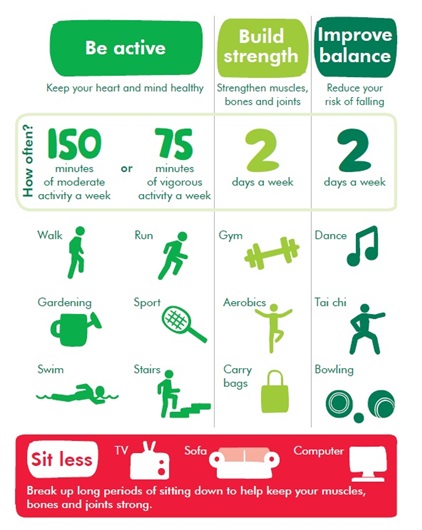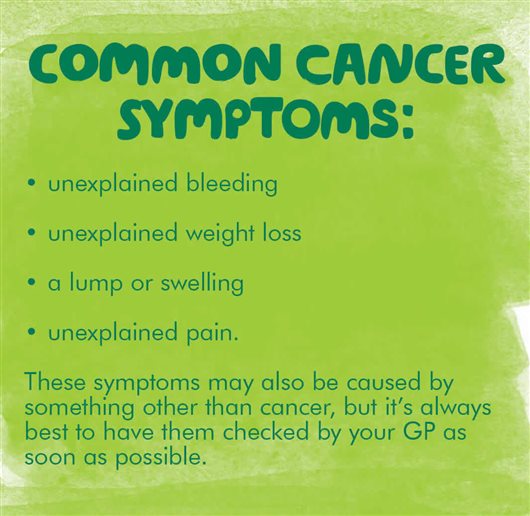February is National Cancer Prevention Month. In this blog, written by editor Liza, we take a look at seven top things you can do to potentially reduce your risk of developing cancer.
Many people think that getting cancer is genetic, or that it is due to ‘bad luck’. While some cancers can be linked to genetics, we don’t know exactly what causes many others. However, we are able to identify some potential causes, and research shows that there are things you can do to reduce your risk of getting cancer.
You cannot remove your risk of cancer completely, but around 1 in 3 cases of the most common cancers could be prevented with lifestyle changes.
So, what can you do?
1. Eat well
There is no single food that causes or prevents cancer. But eating well is important.
You should try to eat foods that are high in fibre (like wholegrain bread and pasta, beans, lentils and oatmeal) and five portions of fruit and vegetables every day.
Limiting how much salt, red meat and processed meat (like bacon, sausages, sandwich ham and burgers) you eat is also important.
Get more information about diet and cancer risk from the World Cancer Research Fund.
2. Keep active
Many studies have found that regular physical activity and keeping to a healthy weight can reduce the risk of several cancers and other health problems like heart disease, high blood pressure or diabetes.
How active should you be? Try to do at least two and a half hours of activity each week. You can split this into shorter sessions. You don’t even have to go to the gym. Regular walking, cycling or swimming can be enough.
You may find this activity card helpful:

3. Stop smoking
If you smoke, giving up is the single most important thing you can do for your health. In the UK more than 1 in 4 cancer deaths are caused by smoking.
If you want to give up tobacco, it’s never too late to stop. Ask your GP for advice, or contact the stop smoking service in your area.
4. Limit how much alcohol you drink
Drinking alcohol increases your risk of certain cancers. In general, the more you drink, the higher your risk.
The current guidelines say that if you drink alcohol:
Remember, the number of units you are drinking depends on the size and strength of your drink. There is more information about alcohol and drinking guidelines at Drinkaware.
5. Protect yourself in the sun
Spending some time in the sun helps you stay healthy. Our bodies use the UVB rays in sunlight to make vitamin D. This is important. But it’s also important to protect your skin from too much exposure, as this can increase your risk of skin cancers.
If you are going to be out in the sun for longer than a few minutes, use a suncream with a sun protection factor (SPF) of at least 30. You should wear loose, cotton clothes that cover your body, as well as a hat.
6. Take part in cancer screenings
Screening uses tests to:
In the UK, there are screening programmes for cancers of the bowel, breast and cervix. Taking part in these programmes reduces your risk of these cancers. If you are registered with a GP you will be invited to take part and have screening tests when needed.
7. Check any changes with your GP
Knowing how your body normally looks and feels can help you be aware of any changes that could be caused by cancer. If you have any symptoms that are ongoing, unexplained or unusual for you it’s important to see your family doctor (GP).
Don’t be scared about getting symptoms checked by your GP. The earlier cancer is found, the more likely it is to be cured.
There are many different symptoms of cancer. Speak to your GP if you notice anything unusual.

We hope this blog helps you identify some key things you can start doing to reduce your risk or find cancers early this Cancer Prevention Month.
If you have any questions or concerns about developing cancer, you can:
To see what else Macmillan's cancer information team has been blogging about, please visit our blog home page! You can subscribe to receive our blogs by email or RSS too.
We're with you every step of the way
The Macmillan team is here to help. Our cancer support specialists can answer your questions, offer support, or simply listen if you need a chat. Call us free on 0808 808 00 00.
Comments? Feel free to add them below (you need to be logged in).
Keep in touch Follow Macmillan’s cancer information team on Twitter @mac_cancerinfo
Whatever cancer throws your way, we’re right there with you.
We’re here to provide physical, financial and emotional support.
© Macmillan Cancer Support 2025 © Macmillan Cancer Support, registered charity in England and Wales (261017), Scotland (SC039907) and the Isle of Man (604). Also operating in Northern Ireland. A company limited by guarantee, registered in England and Wales company number 2400969. Isle of Man company number 4694F. Registered office: 3rd Floor, Bronze Building, The Forge, 105 Sumner Street, London, SE1 9HZ. VAT no: 668265007